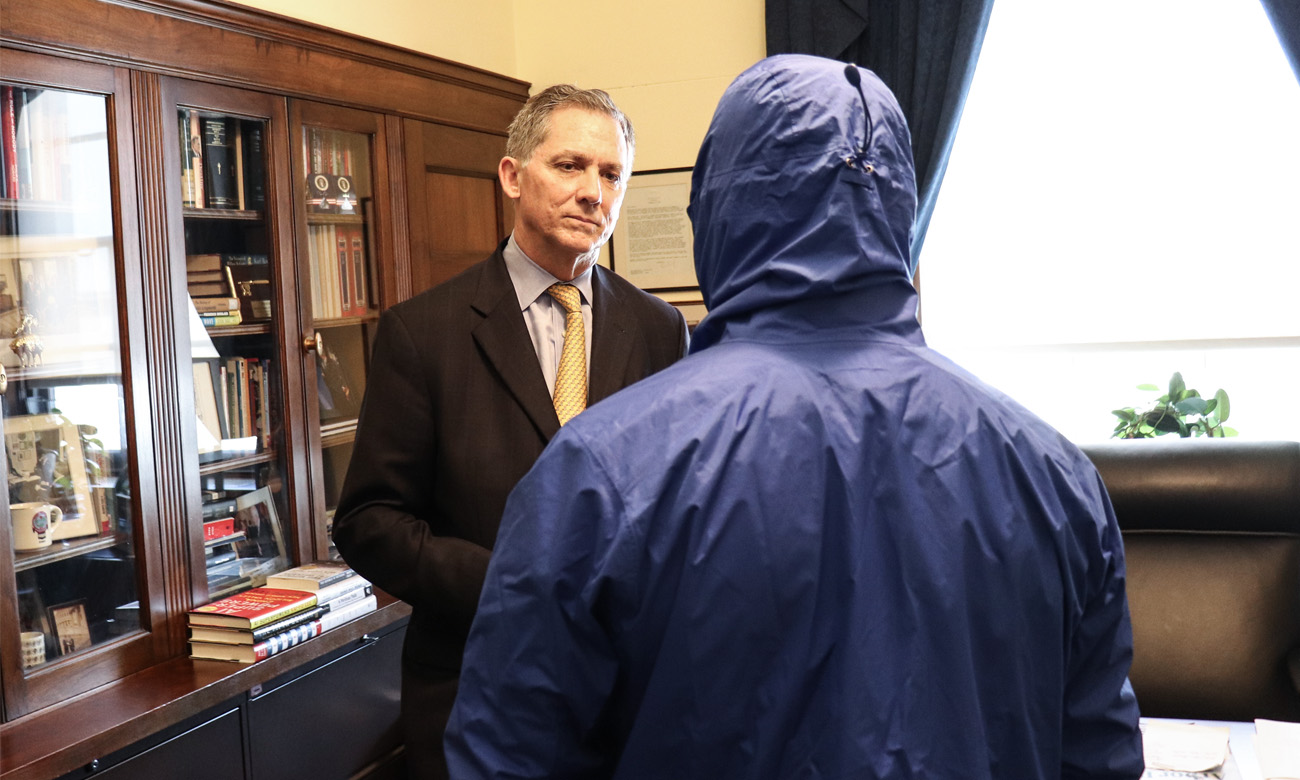



Diana Rahima | Saleh Malas
Around the world, Syrians are making their way to influence international policies related to the Syrian issue, forming pressure and lobbying groups that approach decision-making circles in an effort to be part of what is being drawn in the corridors of politicians regarding Syria.
With 6.6 million Syrians abroad, according to UN estimates, more than a million of them are in Europe and the US and with the establishment of sustainable activities of civil organizations led by Syrians, attempts to influence the available margins of the international political movement in the Syrian issue began to take their own shape.
Over the past century, lobbies of the Jewish and Iranian communities and of some Arab countries have managed to influence Western policies regarding the Arab region. Although the Syrians are still far from achieving what these lobbies have reached, they are putting the first step towards an organized pressure that achieves change on the ground.
In this file, Enab Baladi discusses with a group of political figures, researchers, and analysts how some Syrian lobbying groups have managed to influence the political and human rights fronts, shedding light on challenges, obstacles, and a counter-confrontation by the Syrian regime.
The lobby is a legal right for any Syrian in the countries of asylum and a means to participate in making political and administrative decisions related to Syrian issues.
While the concept of a pressure group for some Syrian groups depends on personal relationships, the Syrian lawyer and founder of France en Arabe, Zaid al-Azm, finds that lobbying must be an institutional process in order to support a specific cause, especially since the governments in those countries allow the establishment of lobbyists as organizations under local laws.
When building a lobby group, these groups must have realistic expectations and should not expect direct results from their work, and should not think that the government agencies that communicate with them will be ready for their immediate support. On the contrary, they must base their work on the long-term cumulative impact.
The strategic value that the idea of creating Syrian pressure groups can add to the Syrian file is filling the void and “not framing Syrian issues in a traditional way from foreign media, which have their own interests and accounts far from the Syrians’ goals and thus the Syrian issue will be presented as the Syrians themselves want to present it, and the Syrian crisis will be addressed by the Syrians, according to al-Azm.
Most pressure groups seek to establish their own media and research centers in order to align themselves with the issues that support them.
Research centers and media need large funding to carry out their work and are often funded by large merchants and businessmen to ensure that studies produce legislation and laws that meet their interests or through lobbyists of politicians.
Pressure groups also provide platforms to advocate for interests that are not adequately represented through traditional methods, whether through the electoral process or by political parties.
The importance of the lobby comes from the fact that it operates in a free, liberal, spontaneous manner and that it is free from organized pressure (meaning that one person presses in one place, while another presses in another place), while the organized pressure remains governed by rules, protocols, and formalities.
Lobbyists are interested in their own and not general categories, while traditional parties try to expand their appeal in an attempt to attract all voters. Thus, pressure groups can express the views or interests of particular groups, focus on specific causes, and better convey their image, and this is the essence of the importance of the existence of pressure groups for the Syrians, according to al-Azm.
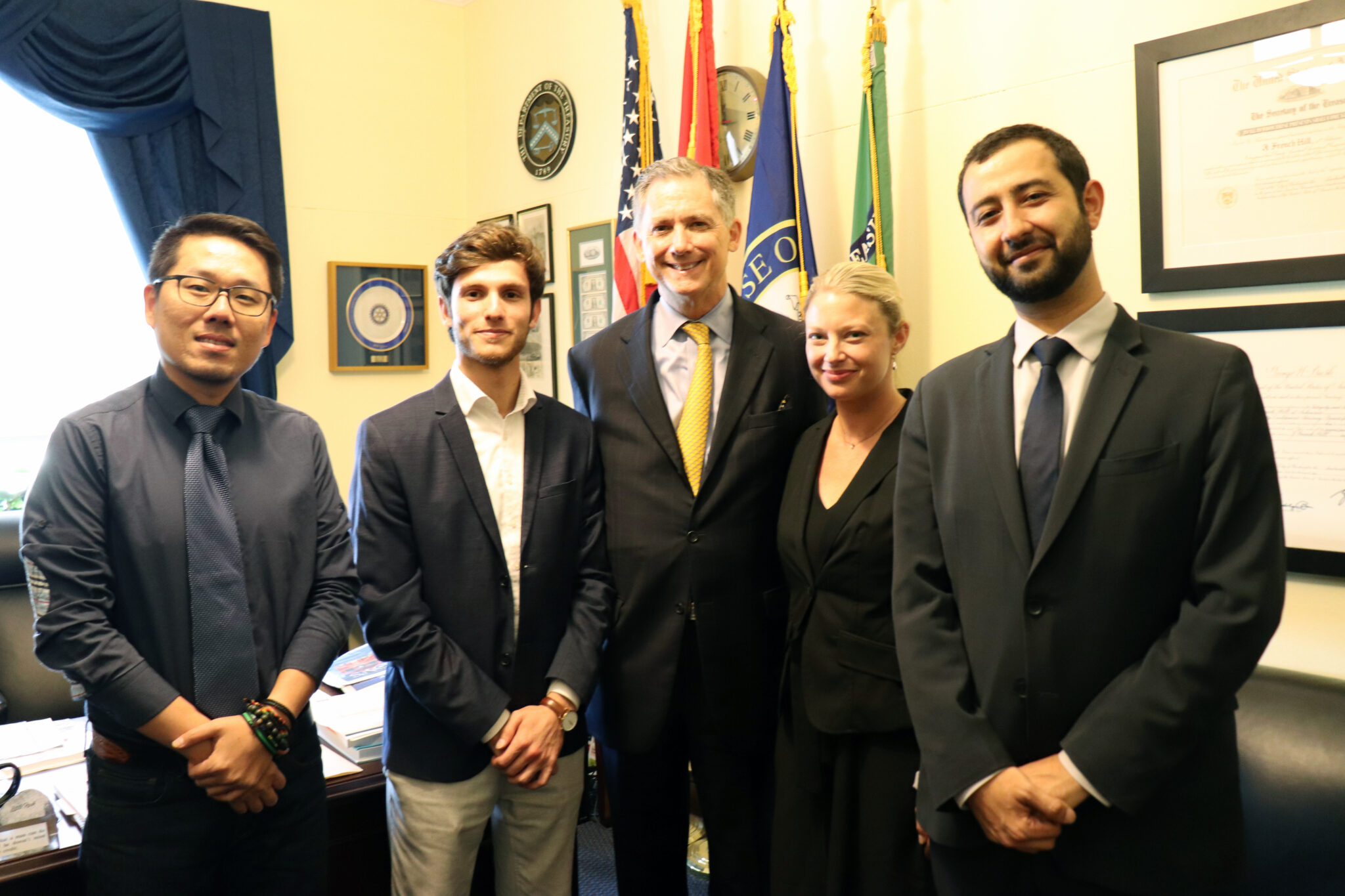
US Congressman French Hill’s meeting with Omar Alshogre (second from left), public speaker and human rights activist, Director of The Syrian Emergency Task Force Natalie Larrison, and Executive Director Mouaz Moustafa (right) – 7 December 2019 (Hill’s official website)
What is lobbying
Lobbying is any attempt by individuals or private interest groups to influence the decisions of government; in its original meaning, it referred to efforts to influence the votes of legislators, generally in the lobby outside the legislative chamber. Lobbying in some form is inevitable in any political system.
Defined as lobbying groups or so-called interest or special interest groups that use various forms of advocacy to influence public opinion and may influence policy.
Lobbies played an important role in the process of developing political and social systems and are still developing them.
Lobbyists vary in size, influence, and motivation, and some have many long-term social goals, while others have specialized goals or have arisen in response to a current issue or issue.
Their motives are based on a common political, ideological, moral, or business position.
Groups use various methods to try to achieve their goals, including political pressure, media and propaganda campaigns, referendums, research, and policy briefings.
Some groups have the support of powerful business institutions or political interests, and they greatly influence the political process, and others have few of these resources.
Syrian groups began lobbying in political files after 2011 and were able to make an impact on some international decisions and policies regarding Syria.
Among the most prominent achievements of the work of Syrian lobbies around the world was the push in the US to implement the Caesar Syria Civilian Protection Act which was initially proposed as legislation by the US House of Representatives on 15 November 2016 and was signed by former US President Donald Trump on 21 January 2019.
The law provides for the sanctioning of anyone who provides support to the Syrian regime and obliges the US President to impose sanctions on countries allied to Bashar al-Assad.
There was also a human rights movement to hold accountable war criminals who sought refuge in Europe after committing violations against Syrian detainees.
Prompted by Syrian human rights defenders, on 19 June 2020, the German authorities arrested Doctor Alaa Moussa, who is accused of torturing detainees and burning their genitals while working as a doctor in Syria.
The Supreme Court in Frankfurt approved 18 charges against Moussa after it was scheduled to open the trial sessions with only eight charges.
On 13 January, the Higher Regional Court in the city of Koblenz, southwestern Germany, issued its second ruling in the case of two Syrian officers accused of being responsible for “crimes against humanity” carried out in Syrian regime detention centers in Damascus.
The court judge sentenced the former colonel in the Syrian General Intelligence, Anwar Raslan, to conviction and life imprisonment, with full costs for those affected.
In February 2021, the court convicted Eyad al-Gharib, and sentenced him to four and a half years in prison for “crimes against humanity.”
Al-Gharib was the lowest-ranking official in the case after the accused, Anwar Raslan, who was previously accused of inciting the torture of detainees, detaining people in 2011, and handing them over to the 251 security branch, where they were subsequently tortured.
In addition to these two trials, which took a great deal of interaction in Syria, there are a number of trials of members and people accused of war crimes from various parties to the conflict who were arrested after they arrived in Europe.
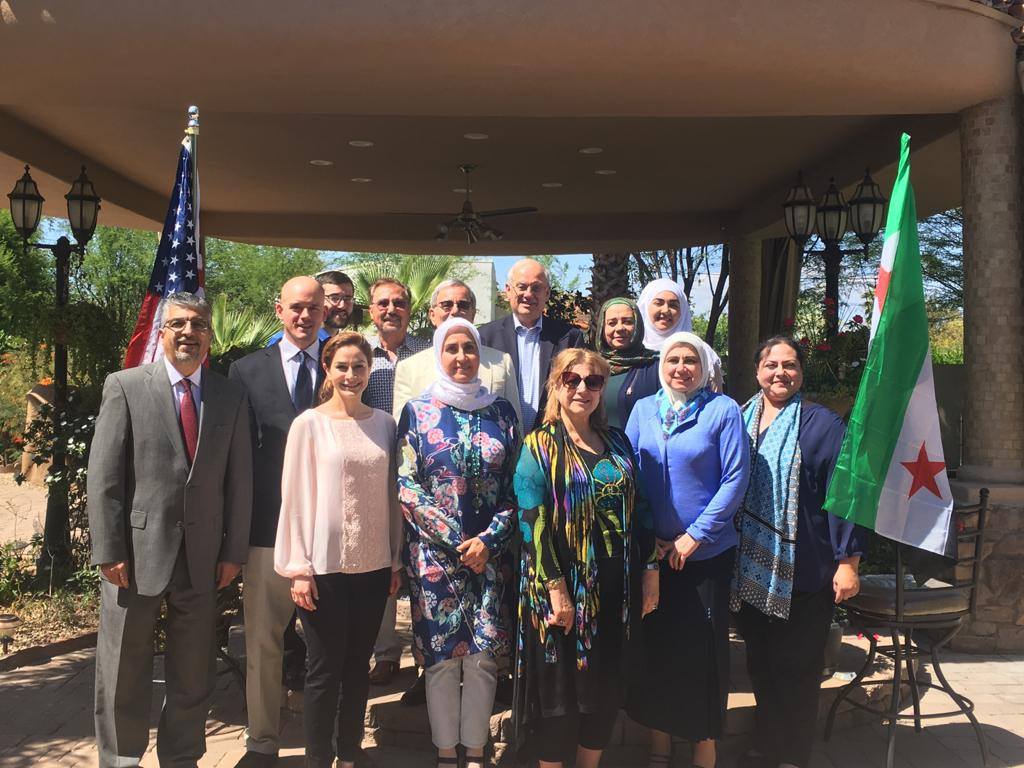
A meeting of the members of the Syrian-American Council in Washington – 4 January 2020 (the Syrian-American Council Facebook page)
Syrian politicians and activists are active in Washington, the most prominent center for policy-making in the world, in an attempt to bring the Syrians’ issues to the corridors of successive US administrations and enact policies that support their causes.
The Syrian lobby in Washington was able to “successfully” put pressure on the US administration for several factors that helped it, the most important of which is that the Syrians started their activities before the Syrian revolution, according to what the head of the Syrian-American Council, Cardiologist Zaki Lababidi told Enab Baladi.
The second factor that helped the council’s work is that many of the Syrians present in it have been immigrants for years due to the political and economic situation in Syria and are old opponents of the Syrian regime.
The third factor is the US laws that allow the Syrians to play a political role in their country and to use the available laws to advance their demands and interests.
The fourth factor is the American influence all over the world, as the Syrian lobby benefits from its presence in a decision-making capital, and nothing moves in the world without Washington having a say in it, according to Lababidi.
Through meetings with members of the government and members of the House of Representatives and the Senate, the Syrian community in the US worked to activate its role and worked to push for “the implementation of laws that punish the butcher government and his aides who continued to torture Syrians, brought the Russian occupation, and allowed the Iranian sectarian militias to take a major role in Syria.”
Based on the council’s activity, Lababidi expects the imminent issuance of laws that restrict both Iran and the regime and are in the interest of the Syrian people.
The Syrian-American Council was formed in 2005 by a group of Syrian immigrants in America, and because it was registered as an organization in Washington, this gave it the freedom to work immediately during the Syrian revolution.
In addition to the council, the Citizens for a Secure and Safe America (C4SSA) organization is active, which focuses its efforts on communicating with Congress to preserve the gains of the revolution in general from the momentum and sympathy of the American people and investing in the laws that have been specifically approved, such as the Caesar Act, and trying to reproduce the experience in other new laws, according to what the director of the organization, Dr. Muhammad Bakr Ghbeis told Enab Baladi.
The organization organized several conferences in which it invited members of Congress and officials in the US administration to discuss the Syrian issue. For example, the December 2021 conference focused on stopping normalization with the Syrian regime, and based on discussions and recommendations, statements were issued by Congress and the administration on the importance of stopping normalization with the Syrian regime.
The organization held a conference last May on the Tadamon massacre and the need for the US administration to deal with this crime appropriately to bring some justice to the innocent victims.
According to Ghbeis, the Citizens for a Secure and Safe America (C4SSA) is working to support the “Anti-Captagon Trade” bill to cut off a large financial resource from the regime and its allies in the hope that it will be passed to become effective on the ground.
The C4SSA organization is trying to work on new laws to follow up the political and economic pressure on the regime, including cooperating with experts and academics to try to devise a project for a “special court for war criminals in Syria.”
The fog of London hides the movements of a Syrian lobby that supports the President of the Syrian regime, Bashar al-Assad, and is run by Fawaz al-Akhras, father of Asmaa al-Akhras (Bashar al-Assad’s wife), who founded Asmaa al-Akhras in 2003, a lobbying group, to which is attributed the roles of propaganda and promotion of the regime’s version of events in Syria, which it considers a war against “terrorism.”
According to its official website, the British Syrian Society has facilitated the visit of more than 80 British and European parliamentarians to Syria since 2003.
In addition to this association, there is also the Working Group on Syria, Propaganda and Media, which includes a group of British academics and researchers affiliated with the extreme left, which inject misinformation about Syrian organizations, most notably the Syrian Civil Defense (the White Helmets).
In the face of these lobbies affiliated with al-Assad, Syrian politicians became active and established associations and organizations to pressure, the most prominent of which is the Syrian British Consortium, which was established in 2019 in London, and it is a mobilization and political advocacy group for the Syrian cause.
The council defines itself as a “Syrian political lobby that supports the democratic transition in Syria,” and therefore, its strategy and action plan are specific, focused, and not dispersed, and it carries out clear-cut political work within a consultative political vision built with council members and a large number of the Syrian community in Britain, the Executive Director of the Consortium, Mazen Ghariba, told Enab Baladi.
The Consortium works closely with Parliament, the British government, and policymakers in a number of other European foreign countries, according to Ghariba, in order to press for a democratic transition in Syria and to hold accountable all individuals involved in human rights violations, war crimes and crimes against humanity in Syria.
Since its establishment, the Consortium has developed a long-term strategic plan based on four main pillars:
The Consortium played a key role in reactivating the “Parliamentary Group on Syria,” a working group made up of a number of British Parliament members from various political parties, which holds periodic meetings related to the Syrian issue.
The Consortium has also become one of the main advisory bodies of the Syrian team in the British Foreign Office, where it is consulted on everything related to the executive, service, and political policies carried out by the British Foreign Office in areas outside the control of the regime in Syria, Ghariba said.
The Consortium was able to hold high-level meetings with a number of British decision-makers in order to keep the Syrian issue on the top of their priorities, such as the meeting with the former Minister for Middle East Affairs, James Cleverly, who is currently the Minister of Education, and who is considered one of the most influential figures in the ruling Conservative Party.
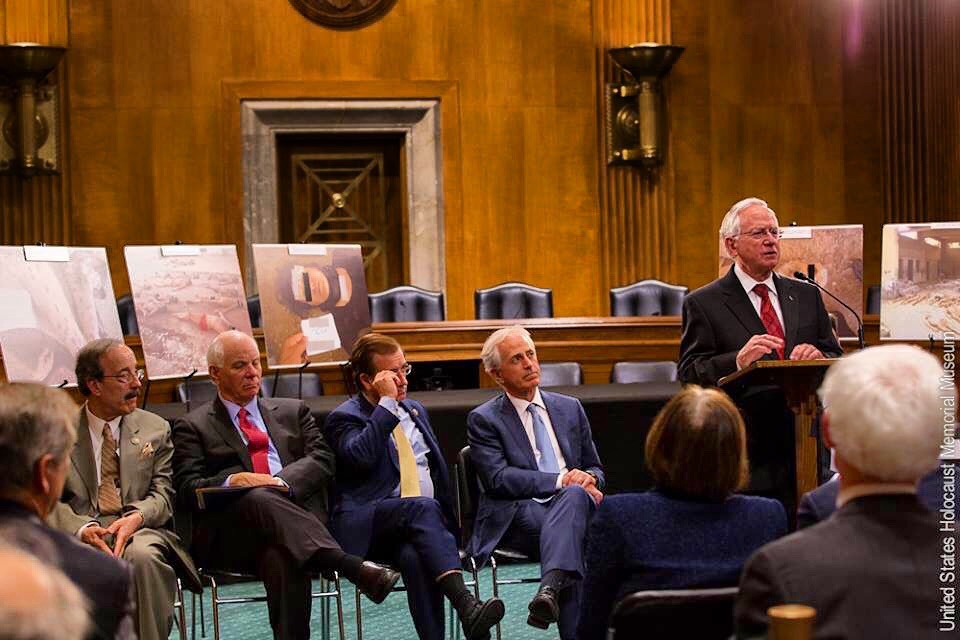
Members of the Syrian Emergency Task Force meeting with the administrators of the Holocaust Museum in the US to shed light on torture to death in Syrian detention centers – 2017 (Mouaz Moustafa’s Facebook account)
Before the start of the revolution in 2011, Syrian organizations in Europe were mostly cultural or professional, aiming to preserve Syrian heritage and educate others about Syria, but with the beginning of peaceful protests, new organizations emerged that differ in their focus points according to the different and multiplicity of Syrian issues.
The Syrian lawyer and founder of the France en Arabe website, Zaid al-Azm, finds that what should be focused on and given the appropriate priority among these issues are the Syrians’ cases.
Within Europe, it is politically, legally, and culturally appropriate to create pressure on governments that are more influential than in other countries.
Former German parliament member Jamal Karsli told Enab Baladi that there are more than one million Syrians in Germany now, a large part of whom have a good education, following the wave of asylum that swept Germany in 2015, but before that, there were about 100,000 Syrians in Germany.
However, despite this, the Syrian community in Germany was unable to form a Syrian lobby that would work against the regime because the German side might not help in that, according to Karsli.
Even the German media, especially the Arabic-speaking ones, were almost boycotting the activities and demonstrations organized by the Syrian community in this regard. On the other hand, there were meetings with those close to the Syrian regime.
According to Karsli, the Syrian community presented projects and ideas to the German Foreign Ministry without any serious interaction with them, considering that Germany only wanted to receive refugees without interfering with any Syrian political activity within its territory.
Among the most important files that the Syrian community was able to activate were the efforts related to holding war criminals accountable while Syrians entered the parliamentary elections, and in the long run, they could push for the establishment of a Syrian lobby capable of influencing, Karsli adds.
In his turn, Syrian lawyer Zaid al-Azm believes that the Syrian lobby in France is weaker than in America or Britain for several reasons, the most important of which is that the Syrians in France are few compared to the Syrians in other countries.
The Syrian lobbies were able to put pressure on the French government and media and on French civil society organizations to hold war criminals accountable, including working to prosecute Rifaat al-Assad, the uncle of Bashar al-Assad.
It also asked the French judiciary to move for the gruesome Tadamon massacre in the southern district of Damascus and to follow up on the case of the Syrian regime’s chemical massacre, to which the French authorities responded, as the Ministry of Foreign Affairs referred documents related to the massacre to the National Anti-Terrorist Prosecutor’s Office (PNAT)for investigation.
On 12 August, the French Europe and Foreign Affairs Ministry said it had “received significant documentation relating to possible crimes committed by the forces of the Syrian regime. The facts alleged are likely to constitute the most serious international crimes, in particular crimes against humanity and war crimes.”
“These documents, consisting in particular of numerous photographs and videos, report on atrocities committed by pro-regime forces during the Tadamon massacre in Damascus in 2013. Several dozen civilians were reportedly killed during these abuses,” according to the ministry’s statement.
“The collection of these documents is the result of the determined work of several human rights defenders, whose courage we salute,” it added.
The pressure groups in France pressured the French government to prevent the (then) regime’s deputy minister of foreign affairs and expatriates, Faisal Mekdad, from coming to Paris, according to al-Azm.
The Syrian lawyer explained the levels of lobbying that start with the government first, then the judiciary, the media, and finally civil society organizations, in order to advocate for the cause of the Syrian revolution.
Syrian pressure groups in Europe are not limited to a specific political aspect, but the Syrian regime uses the same tools that allow it to polish its image in front of the EU governments and public opinion there.
From its claim to “fight terrorist groups on behalf of the world,” the Syrian regime gained some momentum in the West, especially the extreme right-wing parties, to present “propaganda” that supports its stay in power to “fight terrorism.”
The regime has also taken advantage of the Syrian refugee file, which has exhausted the European Union and has escalated operations described as “terrorist,” which refugees are sometimes accused of carrying out.
Western organizations supporting the al-Assad regime are distributed in various EU countries, and the forms and quality of support vary in order to achieve political rapprochement between the Damascus regime’s narrative of “fighting terrorism” and the Western street.
The Syrian regime has worked to support and establish organizations that promote its narratives and claims to be a link for it with the societies in the countries within which it is aware of the effective role of pressure groups that occupy an important space in influencing government decisions.
But tracking the activities of these organizations to counter the narratives that support the regime is not always easy due to the expansion and consolidation of the regime’s networks throughout the period of its rule. Once the Syrian regime has bases of support for it within European societies, it can form alliances with influencers to mobilize support towards the regime’s narrative of what is happening in Syria.
The Syrian activist Kevork Almassian is one of the most prominent influencers in Germany to support the image of the Syrian regime, in cooperation with The Alternative für Deutschland (AfD) party, which opposes the immigration policy pursued by former German Chancellor Angela Merkel, which contributed to the arrival of more than 1.5 million immigrants to Germany in 2015.
A team of seven politicians of the Alternative für Deutschland (AfD) visited Syria during 2018, hoping to boost their party’s efforts to return half a million Syrian refugees currently living in Germany.
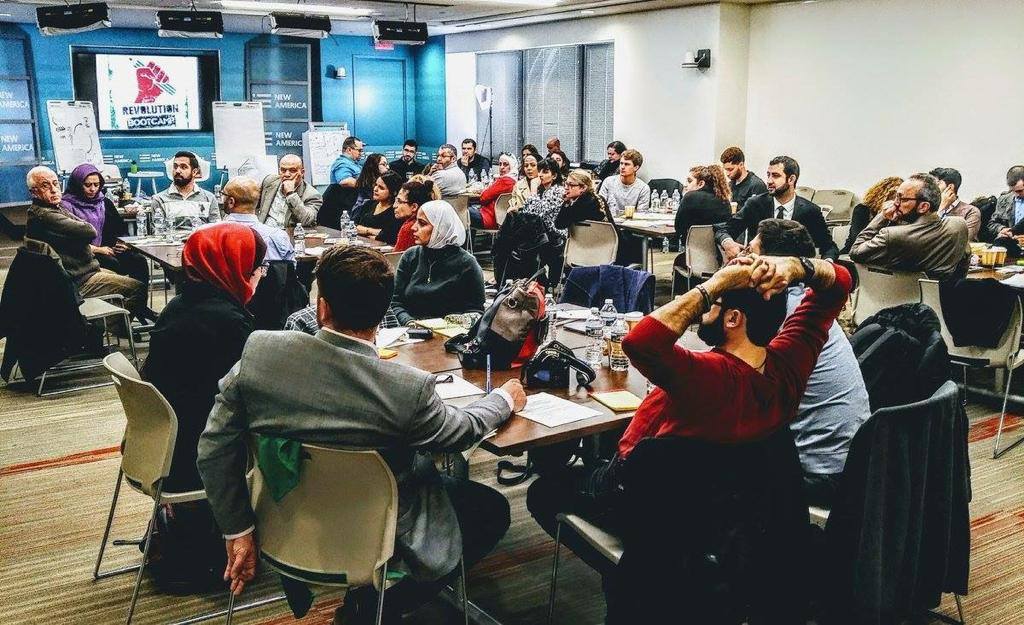
A meeting of the members of the Syrian-British Consortium in Washington – 26 May 2022 (the Syrian-British Consortium page on Facebook)
Enab Baladi tracked the organizations active in support of the Syrian regime, and they are concentrated in the countries of the European Union, in addition to Western countries such as the US and Canada, most notably:
The European Solidarity Front for Syria (ESFS) was established in January 2013, and its main founders were from Italy, Greece, Cyprus, Belgium, the Netherlands, Finland, and Spain, and quickly gained support and acceptance from other countries, particularly in Poland, France, the Czech Republic, Romania, as well as Ireland, Serbia, Britain, Scotland, Malta, Ukraine, Denmark, Sweden, Canada, and Argentina.
The violent group the neofascist Mavros Krinos (Black Lily) was founded in Greece in 2013, and the right-wing Greek Democracy newspaper published an interview with one of the group’s members, Stavros Libovisis, who claimed that the movement has fighters fighting alongside the Syrian regime forces.
In the interview, Libovisis said that the Greek fighters participated in all the major battles in southern and western Syria and were praised for their courage after the al-Qusayr offensive launched by the Syrian regime forces and Hezbollah in April 2013.
An Italian right-wing organization that admires former dictator Benito Mussolini and has carried out racist protests against the Roma community and violent attacks against anti-fascists and leftists.
In 2013, a delegation from CasaPound visited Damascus and announced its support for the Syrian regime. It also met with the Speaker of the People’s Assembly, Mohammad Jihad al-Lahham.
Founded in 2013, a team of seven politicians affiliated with the Alternative for Germany party visited Syria, hoping to boost their party’s efforts to return half a million Syrian refugees currently living in Germany.
This alliance established diplomatic relations with the Syrian regime, as a delegation from the coalition visited Damascus in 2015.
The delegation, which was headed by Alliance chairman, Roberto Fiore, expressed its support for the regime, describing what was happening as “a conflict of civilization and chaos.”
Fiore said that their mission as a “peace and freedom” delegation is to convince the European people to “stand by the civilization represented by Syria and fight terrorism before it reaches Europe.”
Save the Christians of the East was founded in France in October 2013, shortly before its first mission, called “Christmas in Syria,” whose stated goal was to provide assistance to Christians in the Middle East and became increasingly involved in the violence that followed the “Arab Spring.”
The relationship between Save the Christians of the East and the Syrian regime, as well as the “brutal” militias supporting the Syrian regime stationed in Hama governorate, have been documented in the French media since the organization began its work inside Syria in 2013.
This organization includes a group of British academics and researchers affiliated with the extreme left, who are leading media campaigns against the Western press and some humanitarian organizations, and others, accusing them of working for the US Central Intelligence Agency (CIA) and the British Intelligence Service (MI6), with the aim of weakening the government of the Syrian regime by falsifying evidence of civilian casualties and victims of chemical weapons attacks.
Zaid al-Azm said that Syrian lobbying groups in Europe must have a lean and more flexible structure than counter-lobbying groups, adding that sanctions pursue the Syrian regime; therefore, any activity it can perform will be restricted and of limited scope, and any promotional move would cost its budget high amounts, in addition to the cost of circumventing economic sanctions and escaping to more difficult options.
Al-Azm continued that Syrian lobbies must not be fragmented or heterogeneous. There are multiple entry points in any case, and research is necessary to determine the best access points (relationships and contacts) and angles for pressure efforts to stop the regime’s propaganda machine.
It is also important to keep an updated database of the most important figures in European governments, which would help provide different access points, in addition to different people who might have an impact on any of the subjects of interest, according to al-Azm.
Accordingly, Syrians must have a search mechanism to constantly update their information on all developments in European policy, as strategic research-based planning and grassroots organization form the basis of any lobby, al-Azm concluded.
The Executive Director of the Syrian British Consortium, Mazen Ghariba, believes that the foreign affairs and parliaments of European countries have a great and urgent need for the presence of Syrian bodies capable of bridging the knowledge and “political” gaps for decision-makers.
The Syrians assume that these foreign ministers have enough information and documents to carry out their work to the fullest extent, which is a wrong assumption, according to Ghariba.
“There is a gap and a great lack of information in these institutions, and they need the help of the Syrian lobbies,” he adds.
Many Syrian communities in the diaspora also focus on the technical and diplomatic teams of the foreign affairs of the countries in which they reside, which is essential but not sufficient.
Working and coordinating with parliaments in democratic countries is an urgent necessity, as they are the ones who politically pressure foreign affairs, influence public opinion, enact laws, question governments and keep the Syrian issue alive in the minds of politicians, diplomats, and policymakers, Ghariba asserts.
He also pointed to the role played by universities and scientific and academic institutions in policy-making and that engaging with these bodies and coordinating and consulting with them increases the pressure exerted on governments and parliaments.
While the director of Citizens for a Secure and Safe America (C4SSA), Dr. Muhammad Bakr Ghbeis, advises Syrians, wherever they are, to try to learn from the tools and means available to them in the societies and countries they have reached.
He recommends that they use the latest findings of science and human experience in political science and societal change and influence in international foreign policy spaces, and communicate with their brothers and colleagues who have been able to make a difference and an important impact for the purpose of exchanging experiences and accelerating access to the available goals.
Ghbeis also pointed out the importance of directing the compass of work and its priorities for the revolution and the independent national voice in a way that enhances the steadfastness of the Syrian people in the liberated areas because it is the most important factor in making a difference in the corridors of international politics and negotiations that will bring about a political transition.
He concludes that no matter how much lobbies put pressure on states and policies, they will not be able to bring about significant change without the presence of a strong popular incubator that expresses the national voice and has the ability to preserve the gains of the revolution.
if you think the article contain wrong information or you have additional details Send Correction